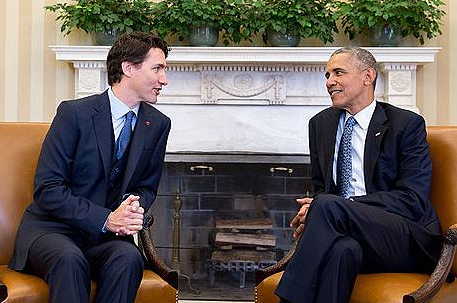I think it’s always been understood that Canada is not a country that’s going to stand up and beat its chest on the world stage, but we can be very helpful in modelling solutions that work. Quite frankly if we can show – as we are working very hard to demonstrate – that you can have engaged global perspectives and growth that works for everyone … then that diffuses a lot of the uncertainty, the anger, the populism that is surfacing in different pockets of the world.
—Justin Trudeau: ‘Globalisation isn’t working for ordinary people’
Fingers crossed for Trudeau and for Canada. The world can use some positive role models now.
December 16, 2016


You can say that again. There are very few of his ilk in the world just now. I however strongly believe that he is in for some serious disillusionment with his refugee policy.
I’m concerned about that too. I hope it works out for Canada and Germany too. Merkel has her heart in the right place, but ….
I like Justin very much from what I’ve read about him.
but then I liked his father too.
Fingers crossed for him!
Globalisation does not work for the ordinary Canadian, that is true. Kudos to our Prime Minister for acknowledging that and actually saying it. By admitting problems and stating them, you take the ‘fire’ out of anger and dissent. For that reason (optimism that the PM is listening) we may be able to avert the populism that is drifting over democracies, world wide. Awareness is one part of it, and action is the other—that is what we need now.
You not only take the fire out of anger and dissent, you have a chance of getting support when you try something else. The Atlantic recently had an article, Globalization Doesn’t Make as Much Sense as It Used To, essentially saying it’s time to try something else:
Fingers crossed for Trump, too. He may be a disaster, or we might be lucky and he does some good.
Trudeau is respected in Canada. I value that he meets any criticism head on, admits or refutes whatever the problem is, and moves on. He has good instincts, and we are optimistic about his future performance.
His honesty and ability to listen to criticism is invaluable. We’re rooting for you!